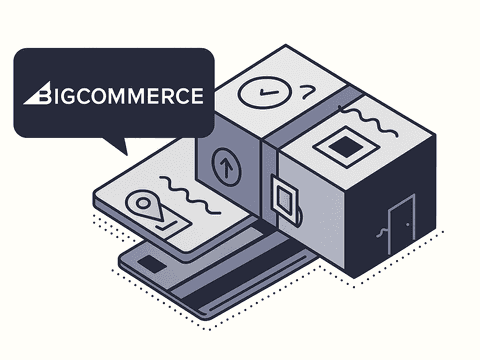Wondering which recommended eCommerce cloud shipping software is right for you in 2025?
Cloud shipping is changing how companies work. In 2024, the market reached $21.5 billion and could double by 2030.
Businesses using cloud tools save up to 25% of their daily time by automating tasks. And 40% of logistics companies say cloud technology is the main reason they stay competitive.
In this article, we’ll compare the top shipping management tools to help you choose the best platform. Explore the leading solutions available.
Comparison of top-rated integrated shipping-management solutions
| 🚚 Platform | 🎯 Ideal for… | ⚡ Signature strength | ⭐ G2 score |
|---|---|---|---|
| Outvio | e-commerce brands that want full post-purchase automation | 💰 Turns shipping into a revenue driver (smart carrier + branded tracking) | ★★★★★ 4.8 |
| ShipBob | Brands that prefer outsourced fulfilment | 🏬 Global warehouse network that picks, packs & ships | ★★★★☆ 3.7 |
| Easyship | Sellers shipping internationally | 🛃 Landed-cost calculator + auto customs forms | ★★★★☆ 4.0 |
| Shippo | Merchants needing fast, discounted label printing | 💸 Up to 90 % carrier discounts via simple API | ★★★★☆ 4.2 |
| AfterShip | Brands focused on post-purchase CX | 📦 Branded tracking pages + real-time alerts | ★★★★★ 4.6 |
| ShipStation | Multi-channel sellers automating workflows | ⚙️ Conditional logic across 70 + integrations | ★★★★☆ 4.3 |
| Sendcloud | European SMEs 🇪🇺 needing quick courier setup | 🏷️ Service-point checkout & QR returns | ★★★★★ 4.7 |
| Metapack | Enterprise retailers with strict SLA promises | ⏱️ Dynamic ETA + carrier fallback | ★★★☆☆ 3.8 |
| ClickPost | Marketplaces & large retailers optimising carriers | 📈 NDR workflows & courier scorecards | ★★★★★ 4.7 |
| ShipEngine | Dev teams that need shipping APIs 🛠️ | 🔗 Unified API for rates, labels & tracking | ★★★☆☆ 3.5 |
| ShipWorks | Warehouse shippers who need on-prem speed | 🖥️ Local scan-to-ship & big batch printing | ★★★★☆ 4.4 |
| ShippingEasy | Small sellers wanting built-in email marketing | 📨 Shipment-triggered campaigns & reviews | ★★★★★ 4.6 |
| EasyPost | Developers building bespoke logistics flows | 🧑💻 SmartRate API with 100 + carriers | ★★★★☆ 4.2 |
What is cloud-based web shipping management?
Cloud shipping is the use of web-based software to manage and automate shipping processes like label generation, tracking, and carrier selection.
What is a cloud shipping management system?
A cloud-based shipping system uses online tools to select carriers and automate shipping processes directly through a web platform.
It connects businesses with their carriers, sales channels, and distribution centers through cloud software, improving data flow and centralizing customer and order information.
How to choose shipping management system based on your needs
Cloud shipping tools vary by focus — from shipping automation and returns to full end-to-end platforms.
The right choice depends on your goals:
- Need an all-in-one solution? Go for a full-suite platform that combines shipping, returns, tracking, and customer notifications. Ideal for scaling while cutting complexity and tool costs.
- Struggling with returns? Choose a tool that automates return labels, inventory restocking, and integrates with your support team.
- Just starting out? Pick a simple, affordable tool with basic features like label creation and tracking. It should integrate easily with your eCommerce platform.
- Shipping internationally? Use a platform that supports international carriers, automates customs forms, handles currencies, and offers multilingual tracking.
- Want to increase sales? Look for branded tracking pages, product recommendations, and delivery notifications that boost repeat purchases.
- Trying to cut support and logistics costs? Automate repetitive tasks, offer self-service returns, and use analytics to identify cost-saving opportunities.
- Managing multiple clients as a 3PL? Select software with bulk order tools, custom workflows, multi-location and multi-carrier support, plus strong API access.
Best 13 shipping management systems and tools (2025 review)
Now that you know what cloud shipping is, let’s focus on what matters most: what is the best cloud shipping software?
Below, you’ll find a comparison of the best integrated shipping solutions.
1. Outvio

Outvio is the most complete shipping software for eCommerce brands that want more than just label printing. It automates the entire delivery process,from smart carrier selection to branded tracking, while reducing costs and improving customer satisfaction.
In terms of features, Outvio is one of the best and most comprehensive shipping-management tools for eCommerce on the market.
G2 Rating
Key features
- Automatically selects the best carrier based on price, speed, and destination
- Instantly generates labels for domestic and international shipments
- Sends branded tracking updates to keep customers informed
- Handles shipping incidents with real-time alerts and support workflows
- Revenue retention tools: refunds as store credit, automated upsells, postpaid returns
- Integrated help desk with live chat and incident management
- Analytics and freight invoice matching to track costs and performance
| Pros | Cons |
|---|---|
| Turns shipping into a revenue driver, not just a cost | Designed for brands that want more than label printing |
| One platform for shipping, support, and returns | Best suited for stores ready to centralize post-purchase ops |
| Built-in tools to retain revenue after the sale | May feel like overkill for very small or early-stage stores |
| Improves cross-team efficiency (ops, support, marketing) | Takes a mindset shift—this isn’t just a logistics plugin |
Starting price: $125/month
2. Shipbob
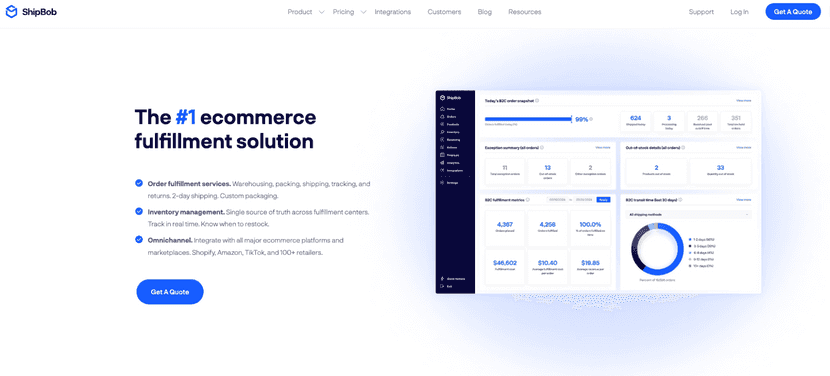
ShipBob is a fulfillment platform that stores products, packs orders, and ships them to customers from different warehouses.
G2 Rating
Key features
- Warehouses in the US, Europe, Canada, and Australia to reduce shipping times
- Real-time inventory tracking across all fulfillment centers
- Automatic order importing and shipping rate calculation
- Returns management and branded packaging options
| Pros | Cons |
|---|---|
| Offers fulfillment and shipping software | Locked into their fulfillment network |
| Scalable for fast-growing brands | Long onboarding process |
| Strong presence in US and global markets | Complex pricing and fees |
| Well-known and trusted brand | Limited flexibility outside DTC model |
Starting price: Contact sales
3. Easyship
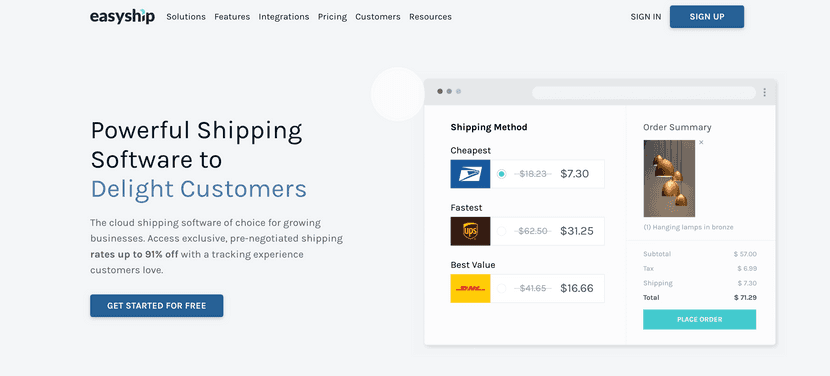
Easyship simplifies international shipping by giving sellers full control over global logistics, taxes, and duties at checkout.
G2 Rating
Key features
- Landed cost calculator shows full price breakdown to buyers
- Auto-filled customs forms and local carrier matching per country
- Checkout widget updates live based on product location and destination
- Shipping rules builder for handling cross-border restrictions
| Pros | Cons |
|---|---|
| Great international shipping options | UI can feel cluttered |
| Wide carrier network | Limited customer support on lower tiers |
| Offers insurance and duty calculations | Pricing is confusing at times |
| Decent startup and SMB fit | Less ideal for high-volume operations |
Starting price: $29/mo (up to 500 monthly shipments)
4. Shippo
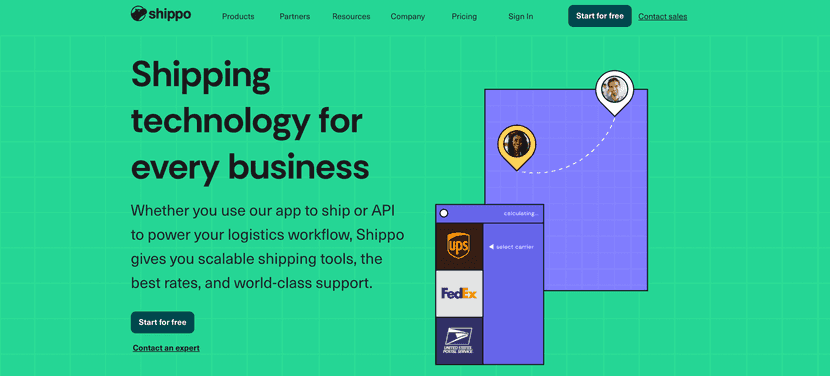
Shippo offers a lightweight solution for merchants who want to connect quickly to multiple carriers and print discounted labels.
G2 Rating
Key features
- Up to 90% discounted rates from USPS, UPS, and DHL
- Standalone label creation without needing a store connection
- Shipping history dashboard to track volume and cost trends
- Quick return label creation for both outbound and inbound orders
| Pros | Cons |
|---|---|
| Simple API integration | Limited advanced features for scaling |
| Affordable and transparent pricing | Basic interface for manual users |
| Pay-as-you-go model | No fulfillment, just labeling and rates |
| Carrier discounts included | Support depends on plan tier |
Starting price: $19/month (up to 200 monthly labels)
5. Aftership
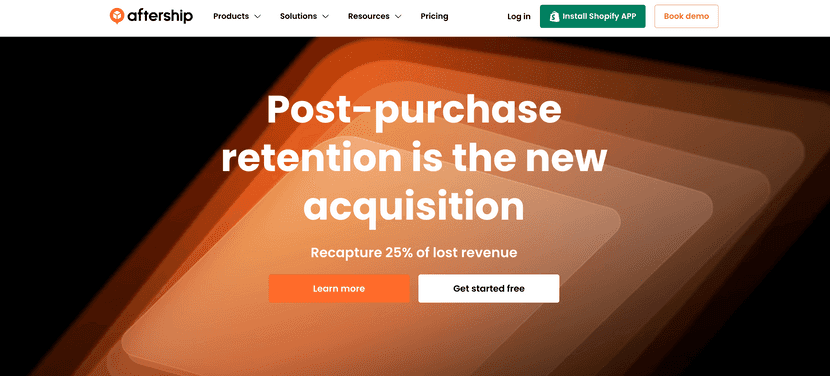
AfterShip specializes in post-purchase communication, helping brands reduce WISMO support with automated delivery alerts.
G2 Rating
Key features
- Branded tracking pages that display upsell products
- SMS, email, and webhook alerts with real-time delivery data
- Shipment analytics dashboard segmented by courier or region
- Exception tagging for lost, delayed, or damaged packages
| Pros | Cons |
|---|---|
| Excellent for tracking and post-purchase | Not a full shipping solution |
| Rich integrations (Shopify, etc.) | Upsells features across many tools |
| Custom branding on tracking pages | Interface can be overwhelming |
| Scales well with enterprise needs | Pricing stacks up quickly |
Starting price: $11/month (up to 100 monthly labels)
6. Shipstation
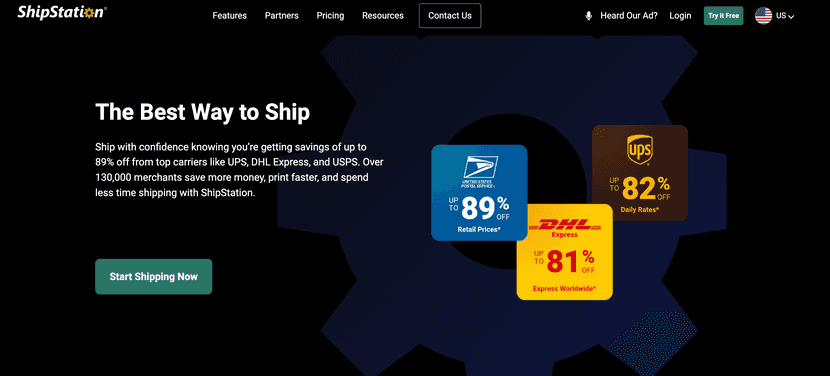
ShipStation is built for multi-channel sellers that need full shipping automation across marketplaces, shopping carts, and warehouse workflows.
G2 Rating
Key features
- Conditional logic to automate package size, service, and carrier
- 70+ direct integrations with marketplaces and POS systems
- Mobile app for label printing and scan-based processing
- Custom packing slips and branded labels by channel
| Pros | Cons |
|---|---|
| Battle-tested platform | Outdated interface |
| Supports many carriers and channels | Steep learning curve |
| Well-documented and robust | Limited support in base plans |
| Good for multi-channel sellers | US-centric (less global focus) |
Starting price: $9.99/month (up to 100 monthly shipments)
7. Sendcloud
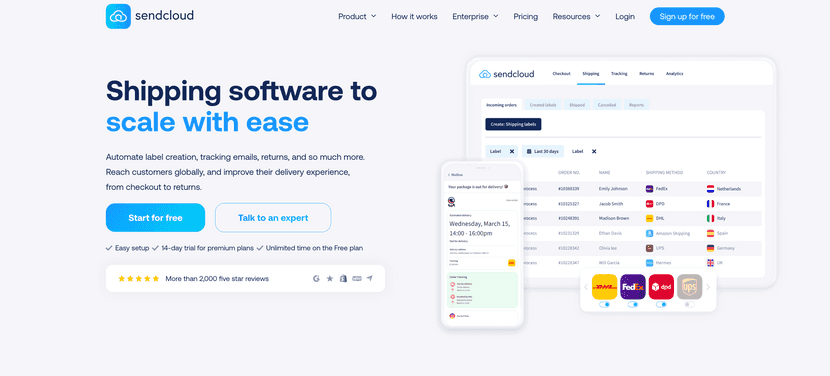
Sendcloud is a European shipping platform made for small and mid-sized merchants who need fast courier setup and returns workflows.
G2 Rating
Key features
- Service point delivery selection at checkout (e.g., Mondial Relay)
- QR code-based returns without printing a label
- Built-in return reasons and refund methods for EU compliance
- Auto-dispatching tool for smaller warehouses
| Pros | Cons |
|---|---|
| Strong European presence | Not ideal for US-based retailers |
| Automations are easy to set up | Mainly focuses on label printing |
| Great for SMEs | Limited customization |
| Modern UI | Not a fulfillment provider |
Starting price: €29/mo (+ €0.10 per label)
8. Metapack
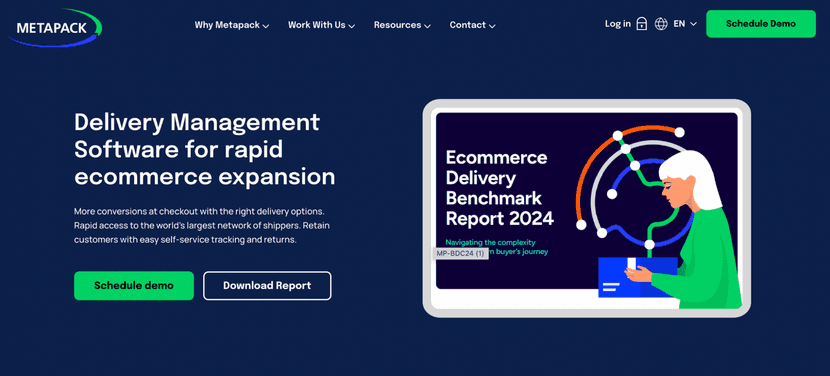
Metapack helps enterprise retailers manage global delivery expectations with dynamic promises and carrier fallback logic.
G2 Rating
Key features
- Dynamic delivery time estimates based on inventory and customer ZIP
- Automatic switch to backup carriers when SLAs risk being broken
- Checkout plugin with multiple delivery method options by region
- Supports international returns with carrier rules per country
| Pros | Cons |
|---|---|
| Built for enterprise-scale logistics | Not a good match for smaller companies |
| Reliable performance tracking tools | Long setup and training times |
| Flexible integration with carriers | Complex workflows |
| Trusted by major retailers | Pricing can be high |
Starting price: Contact sales
9. ClickPost
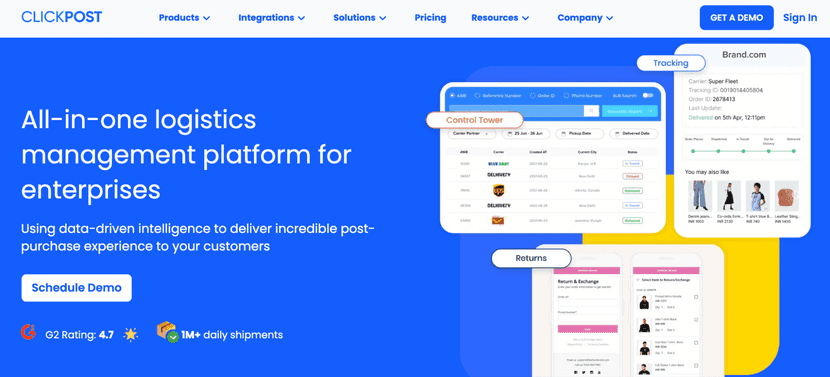
ClickPost is a logistics intelligence layer that helps large retailers improve delivery accuracy, reduce failed deliveries, and track courier performance.
G2 Rating
Key features
- Non-delivery (NDR) reattempt workflows with customer feedback collection
- Courier scorecards measuring delays, damages, and escalations
- Predicted delivery windows (EDD) based on location and courier history
- Carrier allocation optimizer using real-time performance
| Pros | Cons |
|---|---|
| Useful for managing multiple carriers | Steep learning curve |
| Supports marketplaces and large retailers | Requires technical setup |
| Helps optimize delivery performance | Limited presence outside Asia |
| Can handle high shipment volumes | Not intended for small eCommerce stores |
Starting price: Contact sales
10. Shipengine
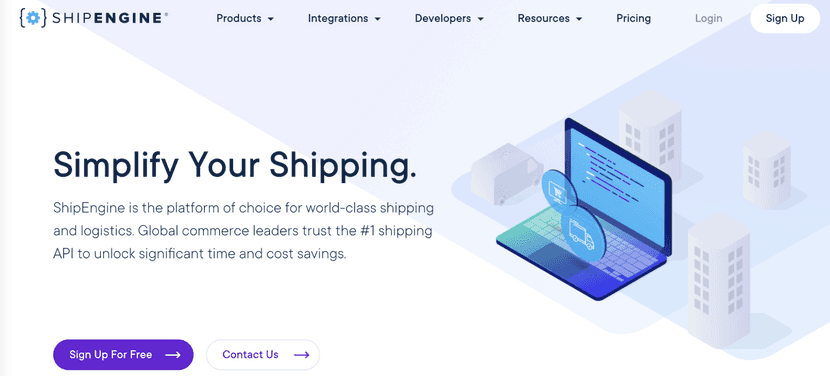
ShipEngine is an API suite that gives developers full control over shipping operations inside their own apps or workflows.
G2 Rating
Key features
- Unified API for rates, tracking, label generation, and address validation
- Instant webhook notifications for label creation or status changes
- Works with your own carrier accounts or third-party rates
- Pre-built modules for fast setup in Shopify, NetSuite, and more
| Pros | Cons |
|---|---|
| Built for developers needing carrier APIs | Not user-friendly for non-technical teams |
| Flexible usage with strong uptime | No visual dashboard |
| Scales with volume | Minimal out-of-the-box features |
| Transparent per-label pricing | Requires technical onboarding |
Starting price: $75/month (up to 1000 monthly shipments)
11. Shipworks
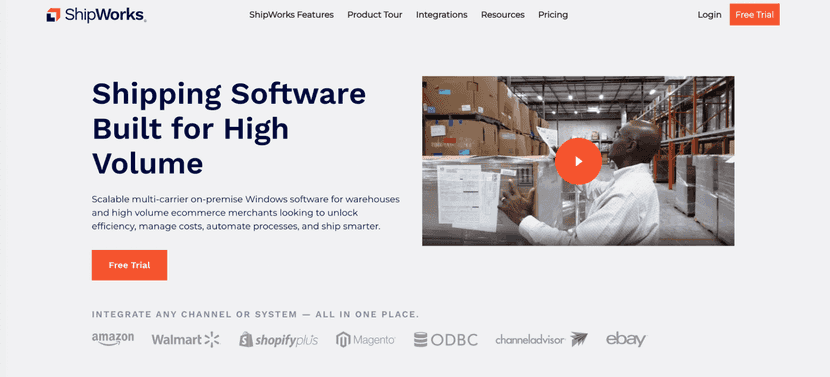
ShipWorks is a high-speed, on-premise shipping solution for warehouses and shippers who value reliability, automation, and offline access.
G2 Rating
Key features
- Local printing and scan-to-ship workflows without cloud latency
- Custom scripts and filters for warehouse teams
- Supports thermal printers, barcode scanning, and shipping presets
- Desktop interface with cloud backup and remote sync
| Pros | Cons |
|---|---|
| Effective for warehouse-based shipping | Windows-only software |
| Handles large batch processing well | Not cloud-based |
| Stable for long-term operational use | Outdated interface |
| Good for on-premise environments | Requires technical onboarding |
Starting price: $149/mo (up to 5000 monthly shipments)
12. Shipping Easy
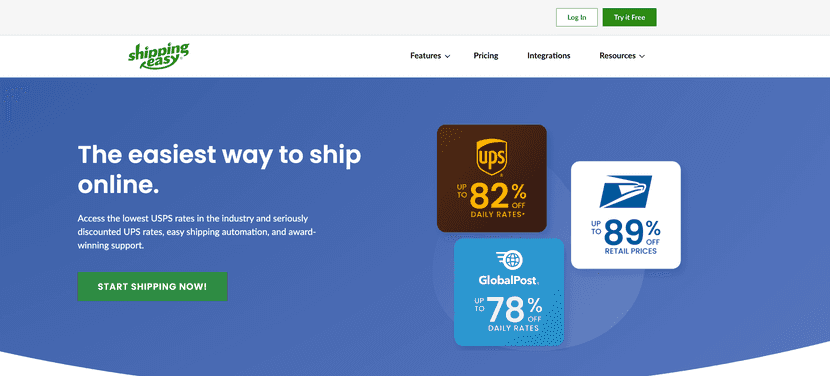
ShippingEasy cloud shipping management system that combines automation with retention marketing, helping small businesses grow repeat orders while managing logistics.
G2 Rating
Key features
- Built-in email marketing for post-shipment campaigns
- Shipment-based triggers for review requests or cross-sells
- Real-time order sync from platforms like Etsy and Amazon
- Inventory alerts and purchase order creation from a single view
| Pros | Cons |
|---|---|
| No monthly fees | Only supports USPS and UPS |
| Straightforward user interface | No support for other carriers |
| No contracts or setup costs | Very limited functionality |
| Good for occasional or small-scale use | Not suited for scaling |
Starting price: $19.99/mo (up to 200 monthly shipments)
13. EasyPost
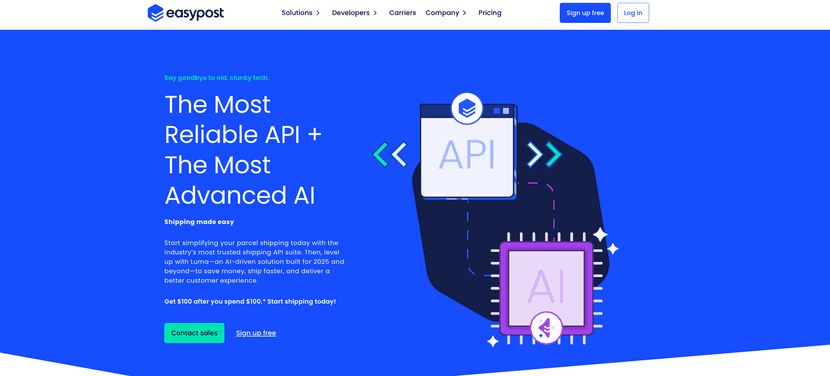
EasyPost is a developer-focused shipping infrastructure platform that lets you build fully customized logistics workflows from scratch.
G2 Rating
Key features
- SmartRate API calculates best balance between cost and speed
- Integrates with 100+ carriers in a single endpoint
- Real-time tracking and address verification through REST API
- Usage-based pricing for flexibility in SaaS or in-house apps
| Pros | Cons |
|---|---|
| API-driven and flexible | Requires technical knowledge |
| Suitable for integrating multiple carriers | Not designed for manual workflows |
| Per-label pricing is clear | Interface is minimal |
| Well-documented developer resources | No built-in support for operations teams |
Starting price: Contact sales
How to improve your shipment management in the cloud
Expand shipping options at checkout
Offering a wider variety of delivery options—such as standard, overnight, economy, or in-store pickup—directly influences customer decisions. In fact, 93% of online shoppers say delivery methods affect their purchase choices.
Cloud shipping management software make it easy to integrate multiple carriers and services, providing customers with the flexibility they expect and increasing your conversion rates.
Automate carrier selection
Carrier selection features allow you to set up rules so the system automatically picks the most suitable carrier based on criteria like dimensional weight, destination, or cost.
Personalize delivery notifications
According to Statista, shipping traceability and the software that provides it are critical to the customer's shopping experience
Branded notifications and throughout the delivery process. This not only builds trust and brand recall but also offers opportunities to upsell or cross-sell related products.
Monitor shipments and resolve issues proactively
Advanced cloud-based shipping management platforms provide real-time shipment tracking and instant alerts for delivery exceptions or delays.
You can quickly detect problems, communicate with carriers, and resolve issues before they impact the customer experience, meeting the expectations of 95% of customers who want proactive problem resolution.
Streamline and automate returns
Returns are a significant part of online retail—nearly 40% of consumers return at least one online purchase per month, and efficient returns management is critical for customer loyalty.
Use returns portals to automate label generation, track returns, and restock inventory. Some platforms allow you to incentivize exchanges or store credit, reducing refund costs and improving retention.
Leverage analytics to optimize performance
Analytics shipping software centralizes shipping data and provides analytics dashboards to track key metrics: delivery times, costs, carrier performance, and customer satisfaction.
Use these insights to identify bottlenecks, negotiate better carrier rates, optimize delivery routes, and continuously refine your shipping strategy for efficiency and cost savings.
Choose the right cloud shipping management system
Select a platform that matches your business needs: some excel at automation and analytics, others at customer experience or international shipping.
All-in-one solutions can centralize shipping, returns, notifications, and analytics, reducing complexity and supporting scalable growth.
Recommend to read
Learn how to professionally manage your eCommerce shipments.
Pricing comparison of web-based ship management software
| Tool | Lower Plan (Monthly) | Higher Plan (Monthly) | Fee (Additional Fees) | Free Trial |
|---|---|---|---|---|
| Outvio | $125 | $250 | $0.10 per extra order | Yes |
| ShipBob | Custom | Custom | Fulfillment fees (storage, picking, etc.) | No |
| Easyship | $29 | $69 | Possible label fee beyond plan limit | Yes |
| Shippo | $19 | Custom | $0.05 per label (on free plan with your own carrier) | Yes |
| AfterShip | $9 | $199 | $0.08–$0.12 per extra shipment | Yes |
| ShipStation | $9.99 | $159.99 | Based on shipment volume | Yes |
| Sendcloud | €29 | €799 | €0.07–€0.15 per extra label depending on plan | Yes |
| Metapack | Custom | Custom | Custom | No |
| ClickPost | Custom | Custom | Custom | No |
| ShipEngine | $75 | Custom | $0.075 per extra label | Yes |
| ShipWorks | $149 | $799 | Requires upgrade for higher volume | Yes |
| ShippingEasy | $19 | $99.99 | $5–$80/month for external carrier accounts | Yes |
| Easypost | Contact sales | Contact sales | Contact sales | No |
Outvio, the best next-generation shipping management system
If you’re wondering who offers the best shipping automation, fulfillment, and post-purchase capabilities, Outvio is the answer. This all-in-one shipping software is built for modern e-commerce. Manage labels, tracking, and courier integrations in one place,
And it doesn’t stop there: Outvio also handles returns, exchanges, product recommendations, branded notifications, and customer support through a built-in help desk.
"At Bulevip we have more than 250,000 references and 1,300 brands. In addition, buyers abroad are growing gradually. This forces us to constantly integrate and manage new couriers. Outvio works as a dashboard from which to manage logistics operations, automate orders, returns, track deliveries, etc. In short, we are autonomous and efficient"
Find out why outvio is the best cloud shipping management system. Book a demo today.


